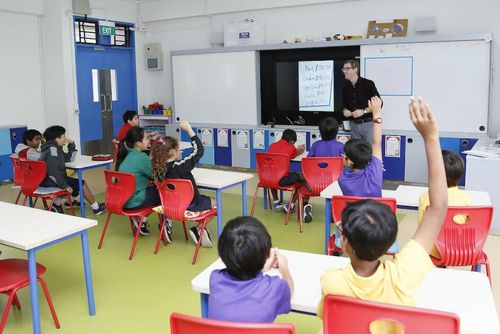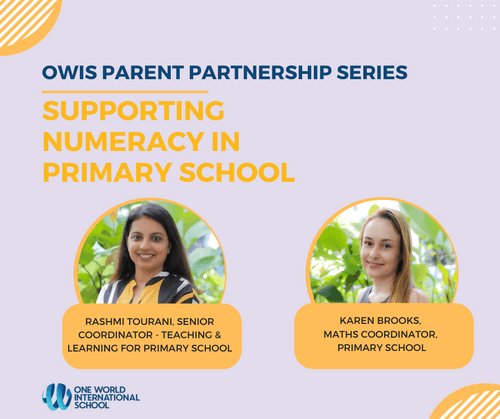At One World International School, we want our students to become lifelong learners who are curious about the world around them, and in order to do that, we actively work to develop their critical thinking skills. The educators at OWIS have found that ‘provocations’ help students make important connections during their units of inquiry, and allow them to naturally hone their critical thinking skills.
Simply put, we believe that the purpose of education extends beyond encouraging students to merely learn facts and memorise data. They must be inquisitive learners who want to find out more about the topics they are studying. By creating a passion for knowledge and skill acquisition from a young age, our students become lifelong learners.

What are Provocations?
Provocations are often an open-minded exercise that teachers use at the beginning of an individual lesson to encourage students to think creatively and critically about what they are going to be learning in the next unit. These provocations allow and encourage children to experience the world through open-ended activities autonomously. The teachers suggest starting points for ideas and allow the students to follow their own train of thought. They are encouraged to discuss ideas between themselves, think about what knowledge they currently have on the topic and what more they wish to discover. The teachers then guide them through the processes that they will use to gain further knowledge and skills. At OWIS, provocations are used to provide students with information about what they can expect from the unit of inquiry that they are studying.
Examples of Provocations at OWIS
Provocations are used in the OWIS curriculum across every grade level, but they are particularly prevalent in the International Baccalaureate – Primary Years Programme. Some examples of provocations that are used in the IB PYP include:
● A teacher may rearrange the classroom furniture without letting the children know in advance. When they arrive in the classroom, they may feel confused by the new set up and will have to work together to adapt. Then, the teacher will explain that they are beginning a unit of inquiry on how living species must adapt to their surroundings. The provocation will allow the students to understand how adaptation works and how it is necessary for survival.
● A teacher may begin a unit of inquiry by asking a simple, open-ended question of the class, such as “What is a community?” They will then have an in-depth discussion where students are invited to share their ideas and thoughts on the topic. After talking about what makes up a community, they can then begin the unit of inquiry about community development and community relationships.
● Children may arrive in the classroom to find a range of different materials provided such as paper, shapes, craft items, clay and writing materials. They are given a topic of ‘Sea Life’ and are encouraged to create something to describe their personal theories and ideas around the topic.

How Provocations are Used Within a Unit of Inquiry
As parents are partners in their child’s education, it’s important that they work actively to develop their child’s critical thinking skills and that they understand how the curriculum at OWIS is implemented. To best understand how provocations are used within a unit of inquiry, parents should first know what a unit of inquiry is within the OWIS curriculum.
A unit of inquiry is a smaller unit that is part of the larger course topic. The unit of inquiry consists of several weeks of lesson plans for the teacher, most of which require the student to perform in-depth analysis on the given topic. The elements that make up a unit of inquiry include knowledge, concepts, skills, attitudes and actions. The teacher will have a plan to use a range of techniques to teach these elements and will allow children to take ownership of their learning. They will act as a guide to support children to learn through doing, thinking and analysing.
Generally speaking, provocations are used at the beginning of the unit of inquiry. When the teacher is going to be introducing the next unit to the class, they typically design a provocation that will require the students to think critically and begin to make connections to the real world about the topic. Provocations are typically inquiry-based, and they often involve hands-on learning exercises. Students are expected to interact and engage with one another as they explore the provocation and discuss its relation to the next unit of inquiry in the course. This early stage helps students get a clear picture of how they are going to learn and what they are going to study whilst giving them ideas for how to work through any obstacles. It helps them feel confident about their new topic.
Provocations play an important role in OWIS’ Primary Years Programme. Parents who are interested in learning more about provocations and about how they can help develop their child’s critical thinking skills are invited to learn more about the OWIS Primary Years Programme today.
(This blog was originally written in collaboration with Ms Erin Smith, former Senior Coordinator – Primary School & PYP, OWIS Nanyang.)














